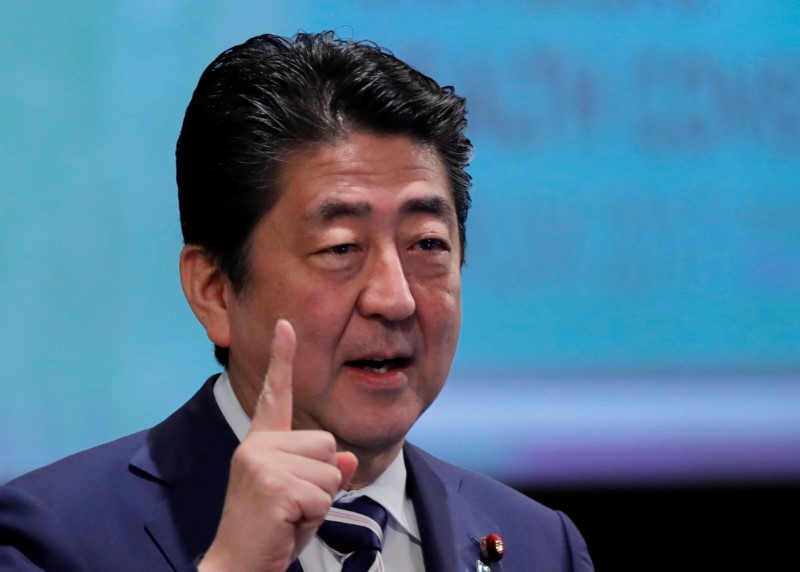 © Reuters. Japan’s Prime Minister Shinzo Abe attends Universal Health Coverage Forum 2017 in Tokyo
© Reuters. Japan’s Prime Minister Shinzo Abe attends Universal Health Coverage Forum 2017 in TokyoBy Stanley White
TOKYO (Reuters) – Japan Inc is running out of excuses in the face of Prime Minister Shinzo Abe’s calls for wage rises of 3 percent or more.
The nation is having its best run of economic growth in a decade, stocks prices are the highest in 26 years, and corporate profits are near an all-time high. At the same time, the labor market, which is already the tightest among major economies, is only set to get tighter as the nation’s population both shrivels and ages rapidly.
And as annual negotiations with labor unions start to ramp up, there are signs that some big companies may be bending as Abe pushes for increases of 3 percent or more, though others are still expected to drag their feet.
Last year, the average increase among 312 major companies was 2.11 percent before bonuses, according to labor ministry figures. Successive years of tiny, or even zero, wage increases may be coming to an end at some companies at least – which in turn could provide consumer spending and inflation with a welcome boost this year.
For example, Asahi Group Holdings (T:) plans to raise wages by 3 percent at its beer-making operation and by 3.4 percent at its unit that produces soft drinks.
Last year Asahi raised wages at its beer-making unit by 2.9 percent. Data on wage gains at its soft drink unit was not immediately available.
“This is a result of management’s thoughts about how we should treat our employees,” President Akiyoshi Koji told reporters at a reception for corporate executives to mark the start of the new year. He denied that the move was influenced by the government’s request to raise wages, saying: “An increase in disposable income helps improve the economy.”
Some other companies are discussing whether to abide by Abe’s call.
“I want to debate this and do as much as possible to make sure disposable incomes rise,” Hitachi Ltd (T:) Chief Executive Toshiaki Higashihara told reporters at a new year’s reception on Friday. “I approve of raising disposable incomes, because in the end this will improve the economy by raising consumption.”
TAX INCENTIVES
Japan’s Economy Minister Toshimitsu Motegi said on Friday he is confident that the conditions are ripe for increases. “Our policies have created the environment necessary for companies to use their record-high corporate earnings to raise wages and increase investment,” he told reporters on Friday after a cabinet meeting. “I strongly believe our changes to the tax code will encourage companies to take bold steps to raise wages and capital expenditure.”
Abe’s government plans to introduce legislation to the regular session of parliament later this month that will lower the corporate tax rate to 25 percent from around 30 percent for companies that raise wages by 3 percent or more. The incentive will appeal to some large companies, but it is unlikely to work with some others who already pay an effective rate below 25 percent. There are also many small companies that have effective tax rates well below 25 percent.
The legislation, which is almost certain to pass into law, will also cut taxes for companies that invest in cutting-edge technology.
The tax breaks are the latest carrot Abe’s government has dangled in front of Japanese companies to convince them to help with his agenda aimed at reflating the economy. Since taking office in late 2012, Abe has appealed directly to the largest business lobbies to raise wages at annual negotiations with unions that take place in the spring. Abe’s overriding goal is to make sure consumers have enough money in their pockets to keep spending – vanquishing the threat of deflation and making it easier to meet the Bank of Japan’s 2 percent inflation target. In November, the core consumer price index, which includes oil products but excludes fresh food, rose only 0.9 percent from the same period a year earlier. Economists say there are many reasons why companies like Hitachi can afford to raise wages.
As well as strong corporate profits, cash and reserves held by Japanese companies stood at an eye-popping record of 1,207 trillion yen ($10.7 trillion) in the third quarter, according to central bank data. Meanwhile, Japan’s jobless rate is 2.7 percent, the lowest since November 1993 and by far the lowest among Group of Seven countries. The shrinking of the working-age population will eventually force companies to raise wages to compete for workers, economists say. But not all companies share the optimism about wages and many firms will come in below the 3 percent increase the government is looking for, economists say. This should still be enough to keep consumer spending on track to rise this year, which will make it easier to achieve faster inflation. “Abe is taking these steps because so far wages have lagged the improvement in the real economy,” said Kentaro Arita, senior economist at Mizuho Research Institute. “The elements needed to raise wages are falling into place, but one thing that is lacking for some companies is confidence about the future. Wage gains will be gradual.”($1 = 112.9500 yen)
(This version of the story refiles to fix grammar in first paragraph.)
Source: Investing.com





























